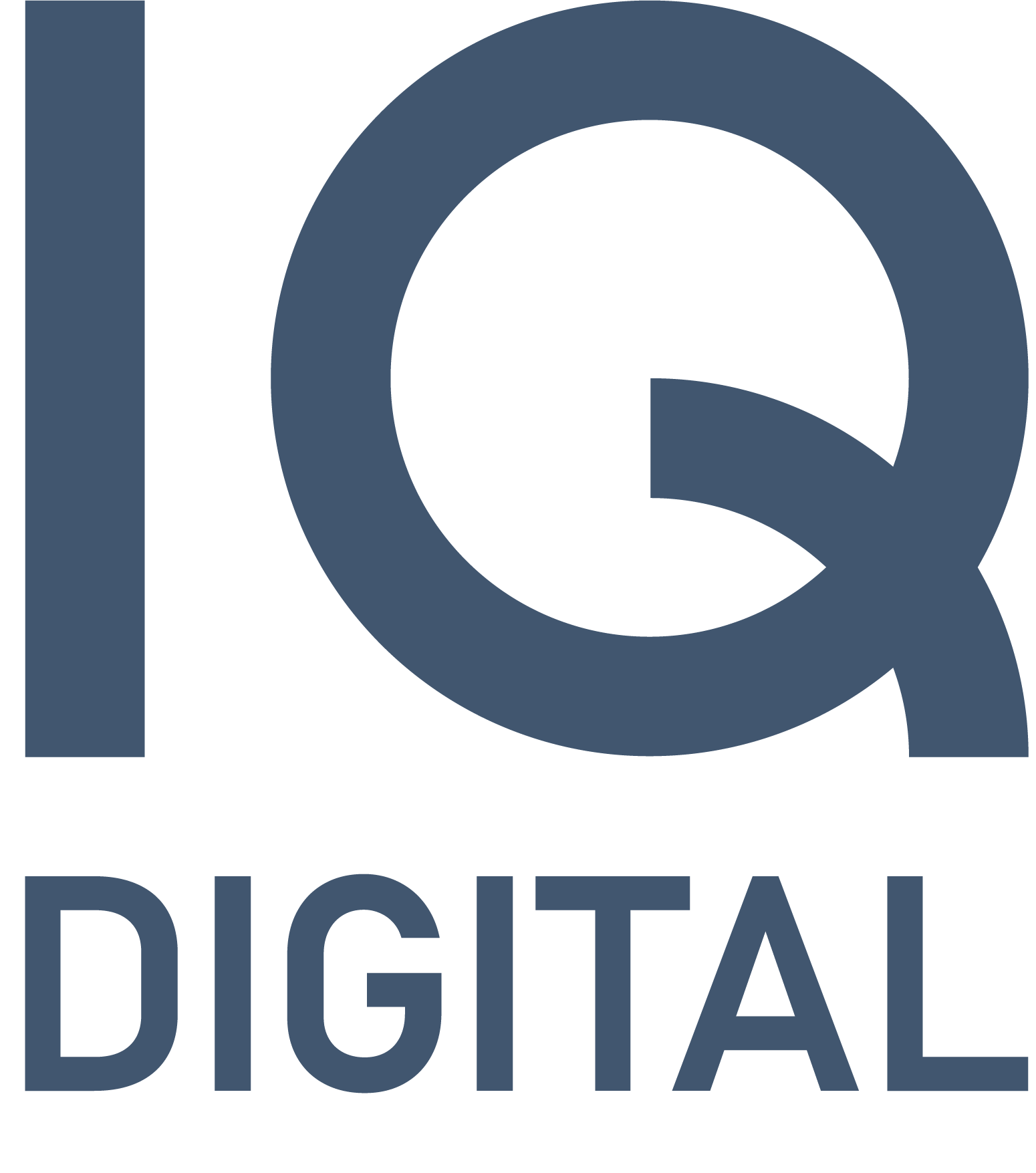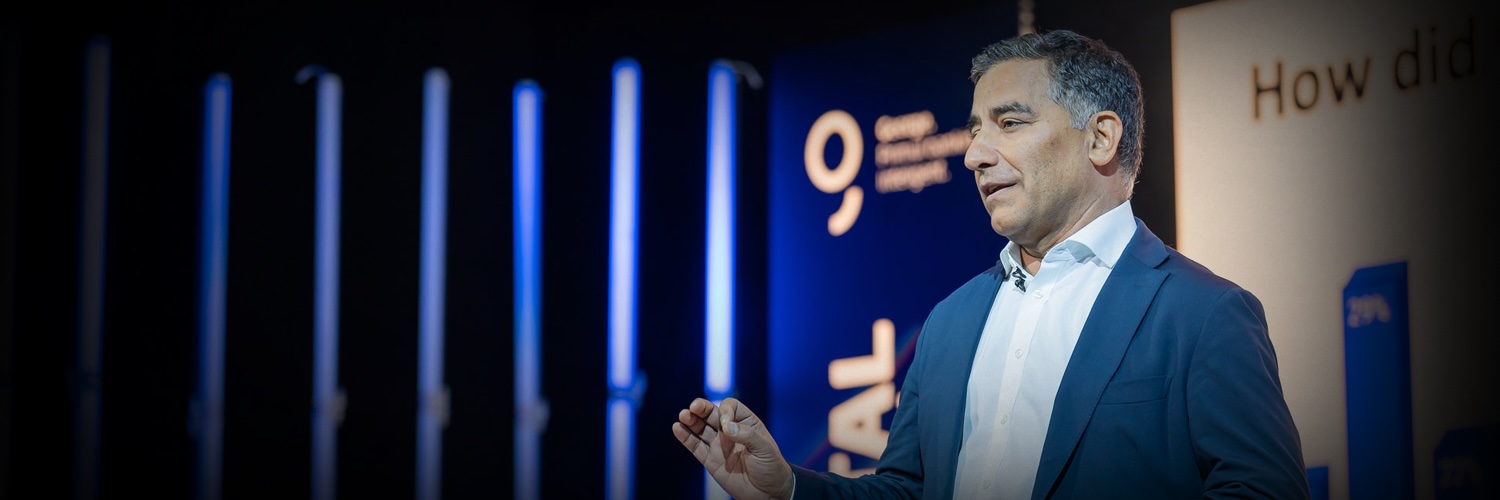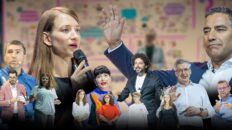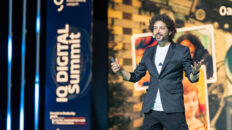Are we ready for the future — a world that, according to current trends, will be radically different from what we know today?
- 🇷🇴 Versiunea în limba română a masterclass-ului este aici
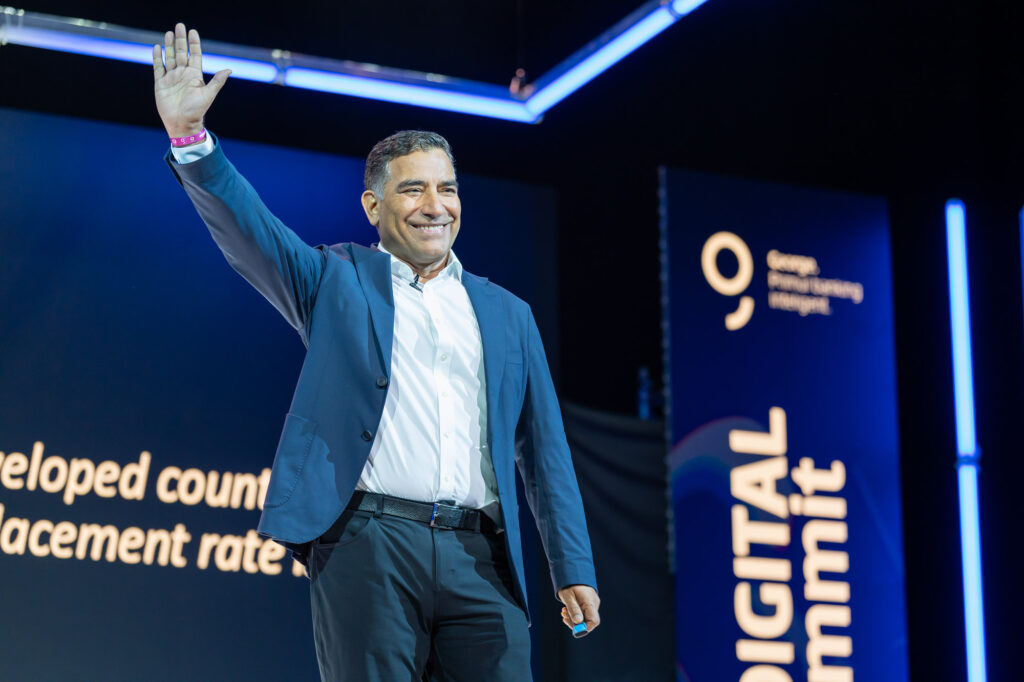
At the IQ DIGITAL Summit in Oradea, renowned British speaker and Professor of Innovation and Leadership at Hult International Business School, Riaz Shah (and former global learning leader at the global giant EY), explained why, during this transitional phase, it’s more critical to ask the right questions than to comfort ourselves with definite answers.
A Look at the Expert’s Perspective
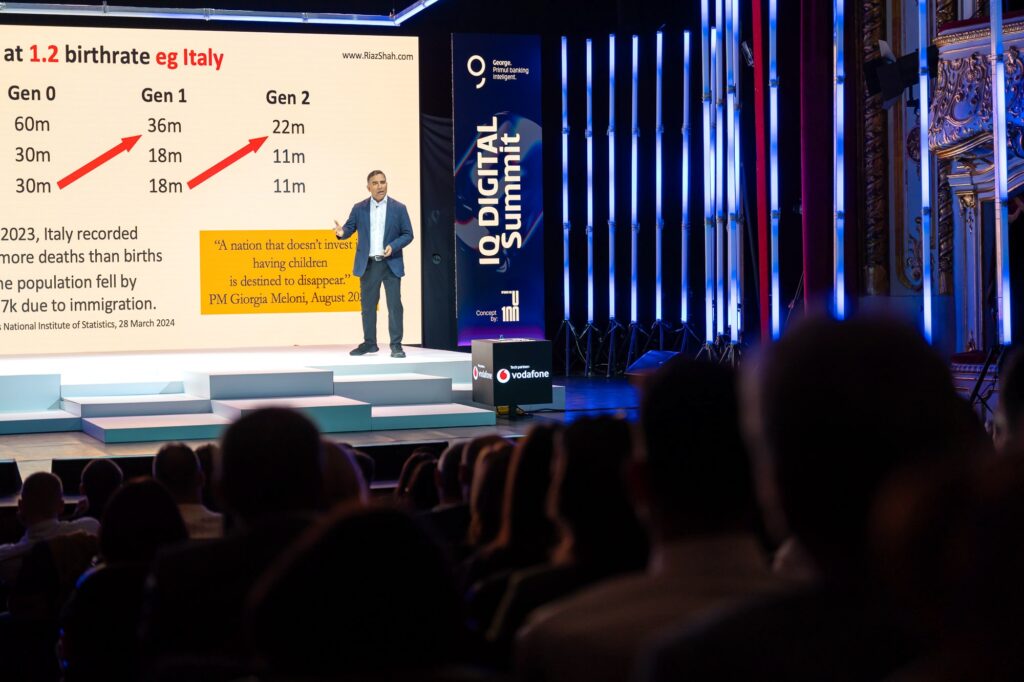
- Which countries worldwide have higher birth rates than death rates?
- How are aging populations connected to trends in immigration?
- How does society change as life expectancy rises and job tasks become more automated?
- How should companies address employees’ demands for a better work-life balance?

Shah’s talk focused on the theme of change, exploring how it influences every aspect of our lives— from the economy and demographics to work and social life.
Over a one-hour presentation — a partial recording is available here but the full masterclass is available for members only (details, bellow) — Shah engaged continuously with the audience, challenging their certainties and encouraging reflection.
WHY DO WE THINK THE WORLD IS WORSE THAN IT IS?
Shah began with a counterintuitive statement:
The world is, in fact, a much better place!
Global progress is evident in reduced poverty, expanded access to education and healthcare, and declining inequality.
However, these achievements are often overshadowed by public discourse dominated by pessimism, driven by wars, pandemics, and climate crises.
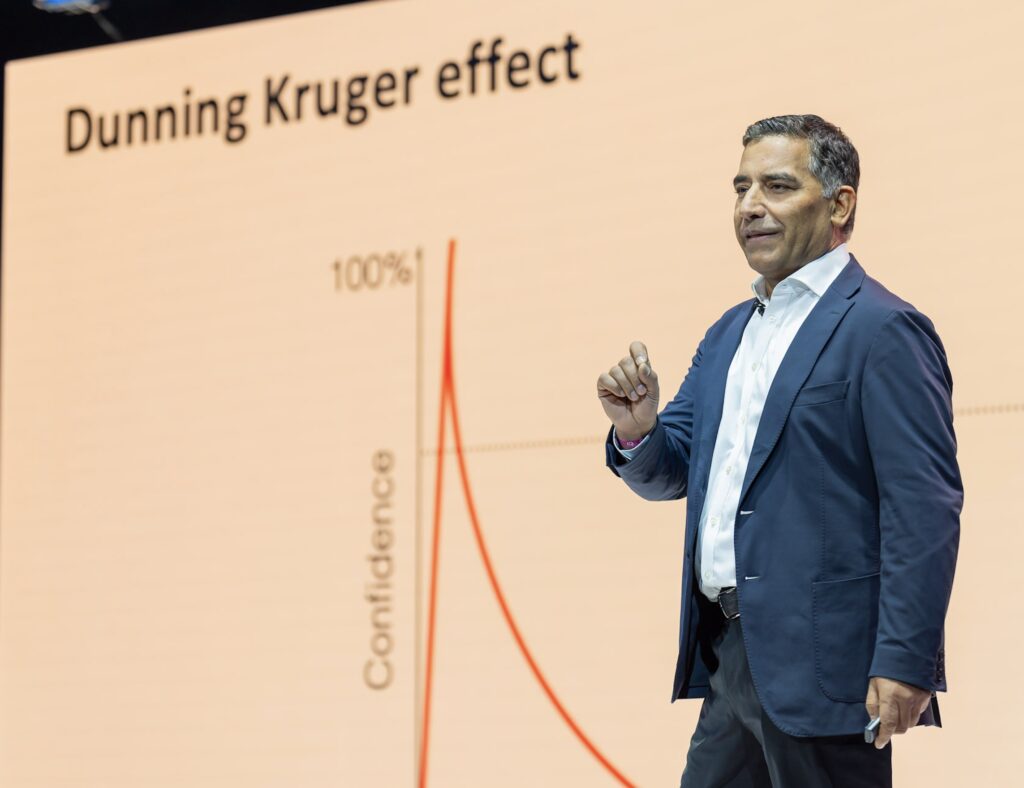
Shah suggests this misperception aligns with the Dunning-Kruger effect: we tend to overestimate our understanding of global issues and judge them through the lens of our limited experiences.
We’re prisoners of our narrow perspective, shaped by media bubbles and information filters.
This effect is amplified on social media, where a cacophony of unqualified or partial opinions breeds chaos and polarization.
As a result, we’re inclined to see the world through a lens of pessimism—an obstacle to both personal growth and business innovation.
An Eye-Opening Experiment for the Oradea Audience
In an illustrative on-stage experiment, Shah invited the audience to gauge their own biases—just as he did live at the summit.
- Check out the moment here and take the same test to see where you stand.

We won’t spoil it for you: find out why most people gave the wrong answers.
A CHANGING WORLD AND A SILENT DEMOGRAPHIC CRISIS

During his presentation, Shah also highlighted a less discussed but equally pressing issue: falling birth rates in most developed countries, especially in the West.
As populations age and fewer people enter the workforce, social systems face mounting pressure—and Romania is no exception.
Here’s Shah’s brief take on it:
Without a young population, who will sustain the economy? Who will fund the pensions of future generations?
Which countries maintain positive growth, and how do those with negative growth stay competitive?
A planet with too few children is doomed to age and may collapse under the weight of its unsustainable promises.
Shah was taken aback when part of the audience humorously acknowledged Romania’s declining population as good news—a brief moment when Romanian wit trumped British humour.
TECHNOLOGY: A DOUBLE-EDGED SWORD
Another crucial topic Shah touched upon was the exponential growth of technology.
Emerging technologies, from artificial intelligence to biotechnology, promise to extend our lives, transform work, and redefine our relationship with the environment.
The promises of the future? Living to 120, eating lab-grown meat, and mentally connecting with machines. It sounds like sci-fi—but it’s closer to reality than we might imagine.
Yet, this future has its costs. Rapid automation threatens millions of jobs, even those once considered secure. From bank clerks to truck drivers, no field is immune to this revolution. Re-skilling and a new work paradigm are essential, as those who don’t adapt may be left behind.
One key question remains: can our slow, rigid educational system keep up?
Universal Basic Income: A Solution?
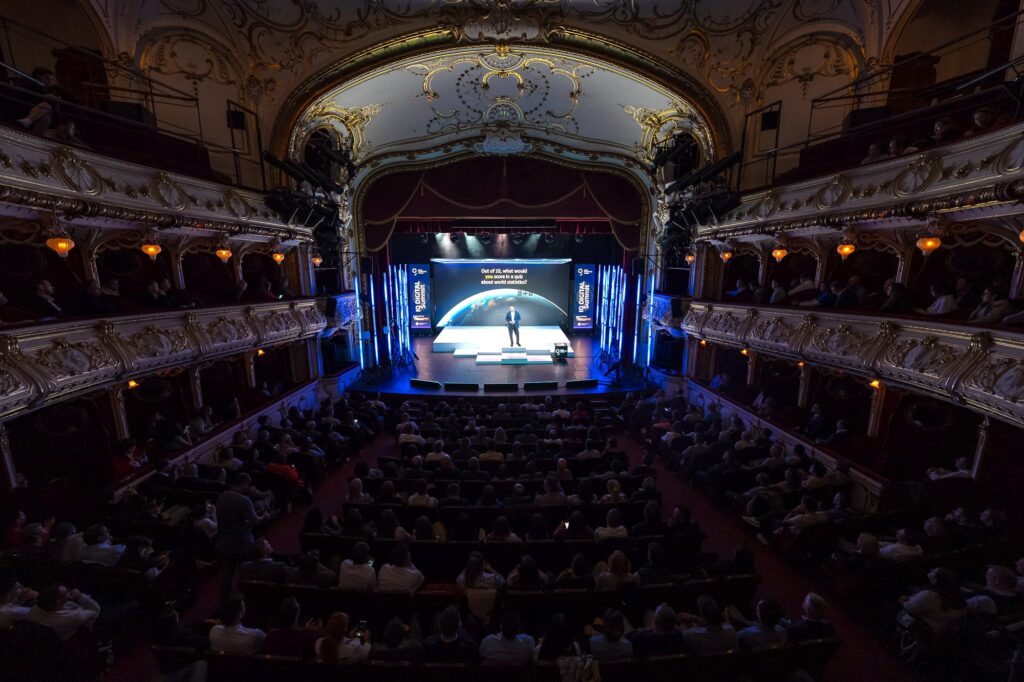
Riaz Shah argues that the traditional life model—split into education, career, and retirement—needs rethinking to suit the modern world.
In his view, a 60-year-old (Shah himself is 62) should be regarded as at the height of their professional expertise, not nearing the end of their career.
With longer lifespans and improved health, people have the potential to remain productive far longer. Shah advocates for a flexible approach in which education, work, and leisure blend seamlessly throughout life.

Additionally, Shah believes technology could offer another advantage: normalizing universal basic income — a “special pension” funded by taxing robotic labor and compensating for job displacement.
He further emphasized that today’s workforce prioritizes autonomy and the freedom to shape their own career paths. Companies that recognize and adapt to these evolving values are better positioned to retain talent.
Just as the eight-hour workday became the norm in the early 20th century, organizations today must explore ways to incorporate these new expectations, creating workplaces that are not only efficient but also flexible and compassionate.
LIVING LONGER. BUT BETTER?
Shah outlined a vision for the future that is both optimistic and, for some, daunting.

The world is changing at a rapid, unavoidable pace. The question is: can we adapt? Or will we, as the Dunning-Kruger effect warns, be too confident and too ignorant to face a reality that no longer resembles the past?
As we see with each global crisis—climate, economic, or social—we’re at an inflection point. The future is filled with promises but also threats.
Are we ready to embrace change? Or will we be thrust, unwillingly, into a world beyond our control?
We may live longer, better, and even create life from stem cells—recreating beloved pets, altering the human genome for desired traits—but…
the future may look like “Mad Max” before it ever becomes “Star Trek.”
Riaz Shah – at IQ Digital Summit
Riaz Shah’s Message for Leaders:
“As humans, we crave certainty, to know what’s coming next. This is uncomfortable, and it’s even more daunting for leaders.
As leaders, perhaps for the first time in history, we don’t have the answers. But we don’t need answers—we need the right questions. Shifting from providing answers and statements to asking the right questions is the key to survival, and perhaps even to success, in this new era.”
⏯️ Highlights from Riaz Shah’s Presentation at IQ DIGITAL Summit:
Key Chapters:
- ▶️ 00:05 The World’s Star Trek Future
- ▶️ 01:45 How Our World Is Changing Faster Than Ever
- ▶️ 02:42 Quiz: Why Are We Biased?
- ▶️ 05:00 The Dunning-Kruger Effect
- ▶️ 06:18 Shrinking Population
- ▶️ 07:03 Italy’s Demographics
- ▶️ 08:36 Birth Rates Around the Globe
- ▶️ 11:35 Understanding Global Population Distribution
- ▶️ 12:31 Old vs. Young: Which Side Are You On?
- ▶️ 13:48 Romania’s Demographics: Causes for Concern
- ▶️ 16:39 Skills & Workforce Shortages
- ▶️ 18:30 Flexibility in the Workplace
- ▶️ 19:00 How Much Time Do We Spend on Social Media?
📍Members Only: The full 55-minute presentation is available exclusively for IQ Digital community members.
Already a Member? You should have received your password via email.
Not Yet a Member? Sign up via email to access exclusive content.
After subscribing, simply use your password to enjoy the full presentation here.
What Else Does the Masterclass Cover?
- ▶️ 21:00 Living Through Multiple “Gutenberg Moments” at Once
- ▶️ 22:12 Food of the Future
- ▶️ 25:40 Are We Going to Live Forever?
- ▶️ 28:25 Tech Revolutions
- ▶️ 29:23 AI Is Taking Over
- ▶️ 31:20 Distinguishing the Real from the Fake
- ▶️ 33:17 AI vs. Humans – Jobs vs. Tasks vs. Skills
- ▶️ 40:00 Rethinking Our Life Trajectory
- ▶️ 41:45 50 Reasons Not to Change
- ▶️ 43:25 Coping with Disruption
- ▶️ 48:30 Crisis – Danger or Opportunity?
- ▶️ 50:50 Is the Future a Threat? Training Ourselves for It
WHAT IS IQ DIGITAL?
IQ DIGITAL is a concept designed by the Upgrade 100 team in collaboration with George – BCR’s innovation division.
The project offers a hybrid media approach to education, including events, podcasts, newsletters, online publishing, and both short- and long-form videos, reaching audiences through online, radio, and TV channels.
Its goal is to support digital transformation in Romania’s SME sector, public administration, and local communities.
📍 Vodafone Romania has joined as a technology partner for the project, and the ASPEN Institute Romania is a key contributor to the Digitalization section.
 George. Primul banking inteligent.
George. Primul banking inteligent.